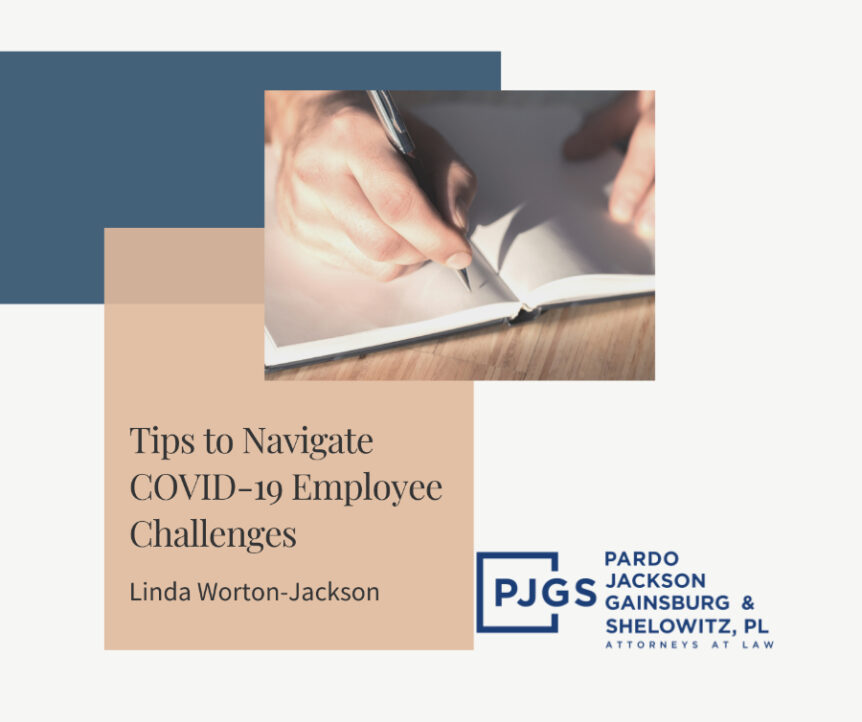By Linda Worton Jackson
Author’s note: I recently collaborated with Overproof to present a webinar about how businesses in the hospitality and beverage alcohol industry could better prepare for the legal and economic impacts of COVID-19. The information below was included in that webinar as well as additional insights. You can view a recorded version of the presentation here.
COVID-19 has presented small businesses with a unique set of challenges and employers are having to navigate uncharted territory, while also trying to stay healthy and keep their doors open. We talked to restaurant, bar and hotel owners and asked them about their biggest concerns and challenges during this pandemic. Here are their biggest concerns, along with advice about how to handle these issues.
Dealing with Employment Issues
Many employers are dealing with pressing concerns about work reduction and termination procedures for both W-2 and 1099 employees. Ultimately, the rules and regulations regarding employment depend on the state and local laws. Most states have at-will policies that allow employers to terminate or reduce work without warning. However this isn’t true in every state, so you will need to make sure you are complying with all laws as you make changes.
If you need to terminate employees, you will be required to pay all wages through the last date of their employment. For terminating multiple employees, you need to use a non-discriminatory termination system. For example, if your normal policy is to terminate based on seniority or performance, continue to follow that policy.
With salaried employees, if you are going to keep them working, you must continue to pay them their full salary even if they aren’t working their usual hours. If you want to make cuts, you have to make an arrangement upfront. In cases where a salaried employee has to take leave as a result of COVID-19-related circumstances, you will be required to provide them with family leave. Keep in mind that this is a government enforced mandate.
When it comes to unemployment benefits, regulations are in a state of flux. Traditionally, unemployment benefits took some time to be approved, would take weeks to receive, and would only cover a fraction of previous earnings. Additionally, part-time workers weren’t eligible for benefits. However, these rules and regulations seem to be changing on an hourly basis as the federal and state governments work to provide businesses and individuals with funding.
In many cases, employers are left wondering whether it is better to move employees to part-time work or terminate them so that they can potentially receive more benefits. Ultimately, there is no clear answer. Do what is best for your business and employees, and work to make sure as many employees as possible can continue to receive health benefits. Most importantly, work to iron out details ahead of time and stay tuned as events unfold.
Does the WARN Act still apply?
The WARN Act was created to provide warning when there are going to be major layoffs that could significantly impact the community. Usually, the act would apply to any company letting go of 50 or more employees. The employer would be required to provide 60-days-notice to the employees and the state and local governments.
However, there may be exceptions to this coming as the act feels irrelevant in light of recent circumstances. As a business owner, it is still important that you provide as much notice as possible and make it clear how difficult it is to make these decisions. This will help with morale and retention down the line. As an employee, try to be understanding with businesses as COVID-19 and the subsequent events were completely unexpected.
Paying bills
You pared back as much as possible and cut services, but you still have old and new bills to pay. How do you prioritize? Ultimately, it depends on what is best for you. You might have to take care of the rent or an aggressive lender first. No matter what, it is most important that you pay employees through their last day of employment.
Landlords
Hopefully, landlords are understanding and flexible, but now is the time to take a close look at lease provisions. While it is hard to give general advice, it is important to look at the details and contact your landlord so that you can try to come to an agreement.
Lenders
Things are changing so quickly that you may experience a sudden increase in business and be able to make payments in the near future. Accessing a line of credit now may be the best way to keep your business afloat.
When it comes to existing loans, take a look at the details. Sometimes you sign loans as a business. Other times, you personally guarantee the loan, which means that you are personally on the hook for payments. If your business isn’t able to pay, you want to know whether you are personally required to meet the payments. As it stands, it looks like a lot of lenders are going to hold off on collections, but it is important to reach out sooner rather than later.
A Final Tip
As circumstances continue to change and businesses are forced to adapt, continue to communicate with employees and stay up-to-date on changing regulations. Make your decisions based off the latest information and remember that funding and other support is being made available on the local, state and federal level so that you don’t have to face these challenges alone.
Editor’s note: To watch Overproof’s webinar, How to Prepare for the Economic & Legal Impact of COVID-19, with a presentation by Linda, click here. For more information, contact Linda Worton Jackson at ljackson@pardojackson.com or visit pardojackson.com

